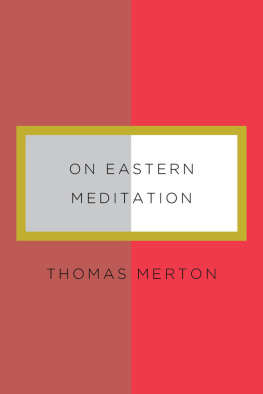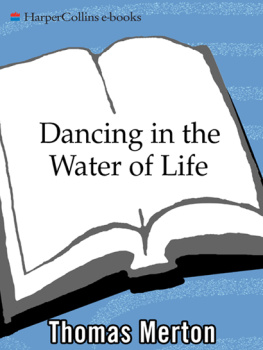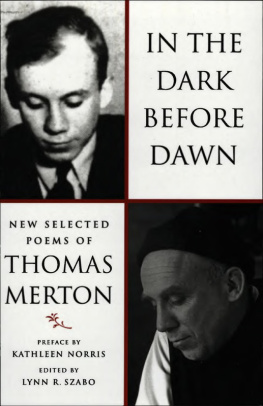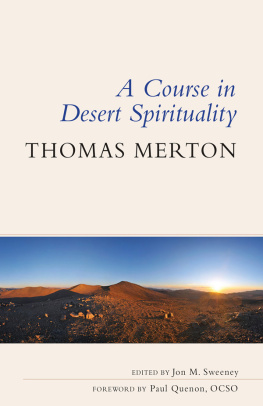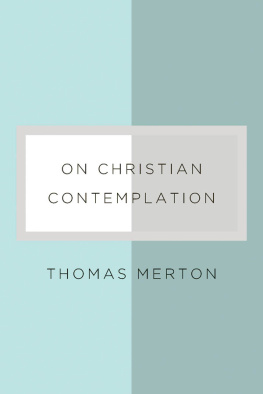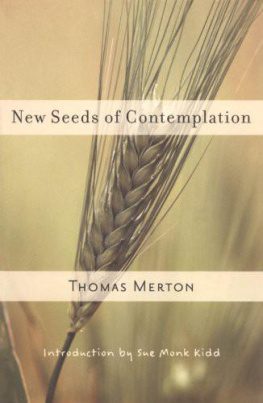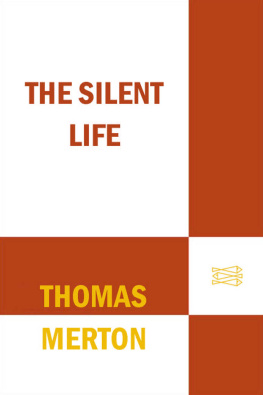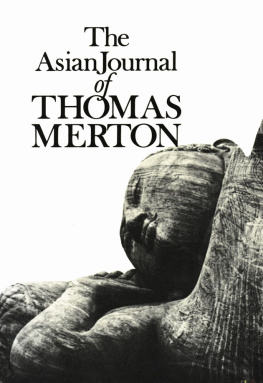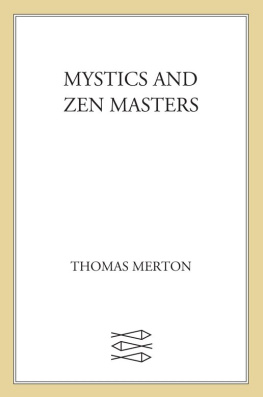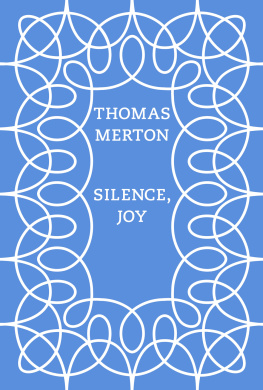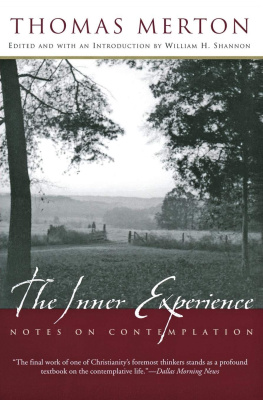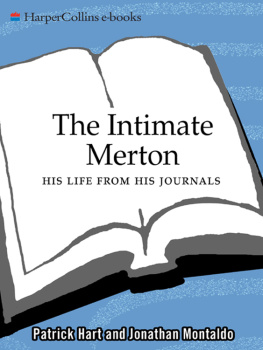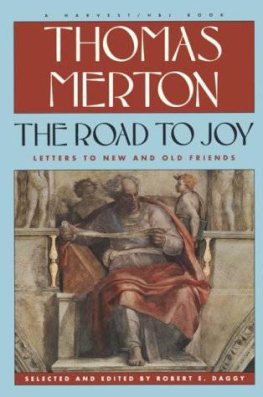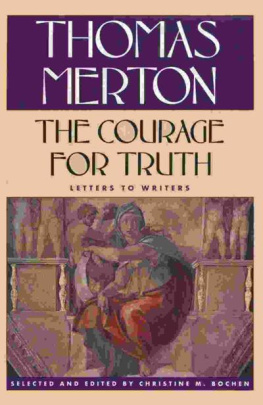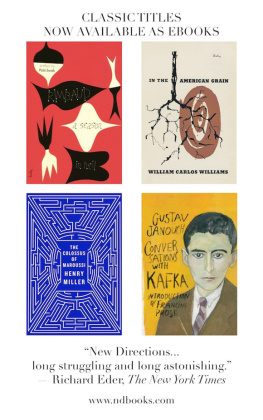Thomas Merton
on Eastern Meditation
Edited, with an introduction, by Bonnie Thurston
A NEW DIRECTIONS BOOK
Copyright 1964, 1965, 1973, 1975, 2012 by New Directions
Copyright 1957, 1963, 1965, 1966, 1967, 1968 by the Abbey ofGethsemani
Copyright 1963, 1968, 1970, 1973, 1981, 1985, 1990, 1995,1998, 2012 by the Trustees of the Merton Legacy Trust
Introduction copyright 2012 by Bonnie Thurston
All rights reserved. Except for brief passages quotedin a newspaper, magazine, radio, television, or website review, no part of thisbook may be reproduced in any form or by any means, electronic or mechanical,including photocopying and recording, or by any information storage andretrieval system, without permission in writing from the Publisher.
Acknowledgments and permissions can be found on page76.
NOTE: While the editor marked allpassages scrupulously, some ellipses and other editorial indications have beenomitted by the publisher to present a smoother text to the general reader.
Manufactured in the United States of America
New Directions Books are printed on acid-free paper.
First published as a New Directions Paperbook ( NDP1227 ) in 2012
Design by Erik Rieselbach
Library of Congress Cataloging-in-Publication Data
Merton, Thomas, 19151968.
[Selections. 2012]
On Eastern meditation / Thomas Merton ; edited, with an
introduction, by Bonnie Thurston.
p. cm. (New Directions paperbook ; NDP 1226)
eISBN 978-0-8112-1995-2
1. Christianity and other religions Asian. 2. Asia Religion.
3. Meditation Asia. 4. Spiritual life Comparative studies.
5. East and West. I. Thurston, Bonnie. II. Title.
BR128.A77M46 2012
261.2'4 dc23
2012001973
10 9 8 7 6 5 4 3 2 1
New Directions Books are published for James Laughlin
by New Directions Publishing Corporation
80 Eighth Avenue, New York, New York 10011
ndbooks.com
Contents
ON MERTON AND THE EAST
AN INTRODUCTION
On September 9, 1968, days before heleft his Kentucky monastery for the Asian pilgrimage on which he died, theTrappist monk Thomas Merton (19151968), copied the following from RobinsonJefferss poem The Torch-Bearers Race into his journal:
We have climbed at length to a height,to an end, this end:
shall we go down again to Mother Asia?
Some of uswill go down, some will abide....
How much did this convert to Roman Catholicismknow about Mother Asia? Why was he so anxious to visit her? These questionsare appropriately raised by someone reading a collection of Mertons thoughts onEastern meditation. This brief introduction hopes to answer these questions andto explain the books principles of organization and selection.
Mertons journey to Mother Asia,... a physical fact anda psychological and spiritual actualization of a symbolic movement, began long before 1968. As a studentat Oakham School in England in the late 1920s, he argued the pro-Gandhi side ina debate (and lost). At Columbia University in the 1930s he read HuxleysEnds and Means and Father Wiegers French translations of Orientaltexts, and he met a Hindu monk, Bramachari, who encouraged him to read Christianclassics. Some scholars think this led to Mertons conversion to Christianity.By then a professed monk at Gethsemani, Merton in his 1949 journal (published asThe Sign of Jonas) mentions a postulant who received Zen training,as well as correspondence with an Indian in Simla about Pantajalis yoga. Br.Patrick Hart, one of Mertons novices, reports that in the 1960s D. T. Suzukistimulated Mertons interest in Zen. By the late 1960s Merton had studied in thebest English translations then available not only Zen, but also Raja Yoga,Tibetan Buddhism, Theravada Buddhism, Madhyamika philosophy, Hinduism,Shankaras Avaita Vedanta, the Bhagavad Gita, Confucianism, and Taoism(particularly Chuang Tzu). He had also practiced calligraphy and brush painting.
Merton was convinced there was a real possibility of contacton a deep level between... contemplative and monastic tradition in the Westand the various contemplative traditions in the East.... Mertons study of Asian religionsled to several publications. After his paraphrase of the Taoist text The Wayof Chuang Tzu (1965) and his collection of sayings of Gandhi,Gandhi on Non-Violence (1965), Mertons largest body of writing onEastern religions is on Zen. It includes Mystics and Zen Masters(1967), Zen and the Birds of Appetite (1968), the posthumouslypublished Asian Journal of Thomas Merton (1973), and IntroductionsEast and West (1981), as well as letters to a dizzying and dazzlingarray of Eastern scholars and practitioners including Masao Abe, AmiyaChakravarty, Heinrich Dumoulin, Thch Nht Hnh, William Johnson, Marco Pallis,John C. H. Wu, and several Tibetan lamas, including H. H. the Dalai Lama.
Merton went East, not as a tourist, but as a monasticpilgrim. He noted in a talk planned for Calcutta in October 1968, I come as apilgrim... to drink from ancient sources of monastic vision and experience. Iseek... to become a better and more enlightened monk.... [W]e have nowreached a stage of (long-overdue) religious maturity at which it may be possiblefor someone to remain perfectly faithful to a Christian and Western monasticcommitment, and... to learn in depth from... a Buddhist or Hindudiscipline and experience.
When Merton turned toward Mother Asia, he was not rejecting hisreligious tradition and commitment, not leaving something behind, but enlarginghis (already expansive) hearts embrace. Merton looked East for language toarticulate his Christian, monastic, spiritual experience, for a culturalalternative to what he saw as the corruptions of Western society, to explore techniques to facilitatehis own spiritual growth, and to encourage the monastic renewal initiated by theSecond Vatican Council. In her outstanding selection of Mertons writings,Christine Bochen makes the point incisively:
Neither a professional ecumenist nor aspecialist in interreligious Dialogue, Merton modeled a way of encounter anddialogue.... Deeply rooted in his own tradition, he was open and receptive tothe wisdom of the worlds religions. Merton embodied the spirit that isessential to building unity: he was open to the experience and perspective ofothers and respectful of their beliefs and practice. He was also clear and firmin his own faith convictions. Searching for common ground, he knew well, doesnot mean discounting ones own roots.
In his Letter to Pablo Antonio Cuadra Concerning Giants,which appears in what may be his best collection of poetry, Emblems of aSeason of Fury (1963), Merton tellingly writes, It is my belief thatwe should not be too sure of having found Christ in ourselves until we havefound him also in the part of humanity that is most remote from our own andGod speaks, and God is to be heard, not only on Sinai, not only in my ownheart, by in the voice of the stranger (italics Mertons).
In Thomas Merton in Dialogue with Eastern Religions, the Mertonscholar William Shannon noted five insights from Western spiritual classics thatresonate with what Merton found in the East: (1) the priority of experienceover speculation; (2) the inadequacy of words to articulate religiousexperience; (3) the fundamental oneness of all reality; (4) the realization thatthe goal of all spiritual discipline is transformation of consciousness; and (5)purity of heart... liberation from attachment.
Mertons pilgrimage East was not about what in Gandhi onNon-Violence he called laughable syncretisms, his principles for contemplativedialogue are universally applicable: Dialogue is for
those who have entered with fullseriousness into their own... tradition....
Second, there can be no question of afacile syncretism.
Next page
